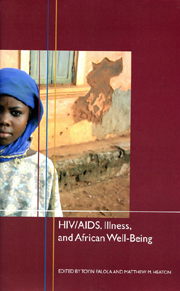Book contents
- Frontmatter
- Contents
- Acknowledgments
- Part I Context
- Part II Illness Case Studies
- Part III Globalization, Development, and Health
- 7 The Microbial Rebellion: Trends and Containment of Antimicrobial Resistance in Africa
- 8 Development and the Epidemiologic Transition in Sub-Saharan Africa
- 9 The Economic Burden of Buruli Ulcer Disease on Households in Rural Ghana
- 10 Health Issues in a Mining Community in South Africa
- 11 Globalization, Health, and the Hajj: The West African Pilgrimage Scheme, 1919–38
- Part IV HIV/AIDS
- List of Contributors
- Index
- Rochester Studies in African History and the Diaspora
9 - The Economic Burden of Buruli Ulcer Disease on Households in Rural Ghana
from Part III - Globalization, Development, and Health
Published online by Cambridge University Press: 05 February 2013
- Frontmatter
- Contents
- Acknowledgments
- Part I Context
- Part II Illness Case Studies
- Part III Globalization, Development, and Health
- 7 The Microbial Rebellion: Trends and Containment of Antimicrobial Resistance in Africa
- 8 Development and the Epidemiologic Transition in Sub-Saharan Africa
- 9 The Economic Burden of Buruli Ulcer Disease on Households in Rural Ghana
- 10 Health Issues in a Mining Community in South Africa
- 11 Globalization, Health, and the Hajj: The West African Pilgrimage Scheme, 1919–38
- Part IV HIV/AIDS
- List of Contributors
- Index
- Rochester Studies in African History and the Diaspora
Summary
Buruli ulcer (BU) is a little understood, severely debilitating skin disease caused by Mycobacterium ulcerans that has serious health and economic consequences. The slow growing environmental Mycobacterium clinically manifests as papules, nodules, plaques, edema, ulcers, and scars with or without contracture. Although its mode of transmission is not fully understood, the disease-carrying agent has been identified as belonging to the family of pathogens that cause tuberculosis and leprosy.
BU begins as a painless nodule. If not treated early, the organism gains access to the subcutaneous tissue and develops a unique toxin called mycolactane that suppresses the immune system, and invades the lymphatic system and blood vessels of the patient. The patient feels no pain until it is too late, by which time the patient's skin tissue and other vital organs have been severely damaged. The result is extensive scarring, permanent disability, or in very rare cases even death. Medical treatments for the lesions are generally disappointing, leaving wide surgical excision as the only effective treatment. Generally, treatment involves hospitalization for debridement and skin grafting, which frequently has to be repeated. Current epidemiological studies reveal lopsided prevalence rates among children between the ages of 2 and 14, although the disease is not confined to any specific age group.
Few studies have assessed the economic impact of BU on its victims. With the exception of two studies, one in the Côte d'Ivoire and the other in Australia, most of the existing research on the economic aspects of the disease has been conducted in Ghana, one of the most severly affected countries.
- Type
- Chapter
- Information
- HIV/AIDS, Illness, and African Well-Being , pp. 199 - 209Publisher: Boydell & BrewerPrint publication year: 2007



